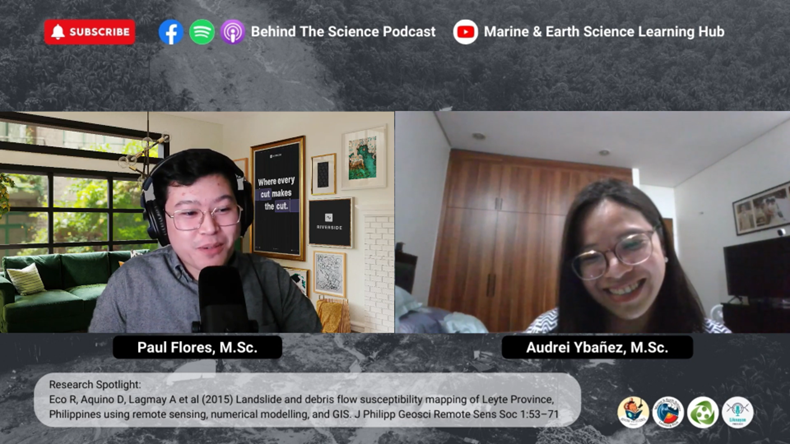Episode 46 of Behind the Science Podcast chronicles the evolution of landslide hazard mapping through advances in technology and fresh perspectives. Ms. Audrei Anne Ybañez’s of UPRI-NOAH Hazards Assessment Team discusses her team’s paper on producing community-level landslide susceptibility maps for the province of Leyte, sharing insights into the research process and the collaborative effort behind it.
Ms. Ybañez traces her interest in science back to high school, where she discovered her love for physics and math—not chemistry or biology, just physics. This interest led her to pursue and complete a bachelor’s degree in physics. After graduating, however, she felt the need to apply her knowledge to work that would make a meaningful impact in the Philippines. While many of her peers ventured into medicine or biology, she chose earth science and was thrilled to be accepted to the UP National Institute of Geological Sciences for her master’s degree. It was there that she fell in love with geohazards, geophysics, and—on a more personal note—a fellow researcher from the Volcano-Tectonics Laboratory, Mr. Richard Ybañez who is now her husband and has been previously featured on the Behind the Science Podcast.

With almost a decade of experience at Project NOAH (formerly under the Department of Science and Technology, now supported by UP through the University of the Philippines Resilience Institute), Ms. Ybañez has worked with an incredible network of young researchers. Many of these collaborators have since gone on to pursue doctoral degrees, post-doctorate research, or other roles at various research institutions. The paper discussed in this episode is one of their earliest joint publications, capturing the beginnings of many now-established researchers.
For dedicated followers of the BTS podcast, this episode serves as an excellent year-end recap, revisiting key concepts and fond recollections of collaborators from earlier episodes. Familiar names such as Mr. Richard Ybañez (Episode 6), Dr. Likha Minimo (Episode 8), Ms. Carmille Marie Escape (Episode 12), and Dr. Maricar Rabonza (Episode 21) are mentioned as part of the narrative. For new listeners, this episode offers a compelling introduction to the podcast’s themes, offering an insight into the blend of technical expertise and personal connections that drive scientific research.
The paper Ms. Ybañez shared highlights the collaborative work of 24 researchers, each employing different methods to analyze landslides including numerical modeling, landslide inventory, and debris flow modeling. Together, they produced high-resolution hazard maps—finer than those available at the time—which could be used for community land-use planning, disaster preparedness, and other development initiatives. What sets it apart is the concept of delineating safe spaces. Unlike coarser renderings of the time, their maps were detailed enough to identify areas suitable for evacuation centers, schools, and other critical facilities which is essential for resilience-building.
Discover more about Ms. Ybañez’s life as a researcher in disaster science. The Behind the Science Podcast is presented by Marine & Earth Science Learning Hub, UP Resilience Institute, and Liknayan Podcast. Tune in here:
Youtube: bit.ly/btspodcast-yt
Spotify: bit.ly/btspodcast-spotify
Facebook: https://bit.ly/btspodcast-fb
📚Research spotlight:
Eco R, Aquino D, Lagmay A et al (2015) Landslide and debris flow susceptibility mapping of Leyte Province, Philippines using remote sensing, numerical modelling, and GIS. J Philipp Geosci Remote Sens Soc 1:53–71
Do you want to nominate a scientist in the field of DRR and geosciences to be featured on the Behind the Science Podcast? Or, have you read an author’s publication whose behind-the-scenes story you are eager to hear about? Email us at upri.educ@up.edu.ph, and we will do our best to feature them on the BTS Podcast!
